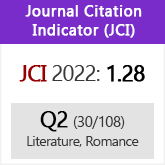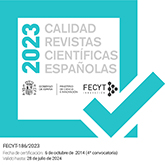Misoginia y exculpación: el canto a Teresa
DOI:
https://doi.org/10.3989/revliteratura.2000.v62.i124.467Abstract
In Espronceda's autobiographical poem, certain circumstances of his adulterous love with Teresa Mancha de Bayo are expressed in such a subtle, poetic form, that it is necessary to collate them with history to clarify them. The Canto is the public version of this love affair, which led to the moral corruption and death of Teresa, and in it Espronceda converts his lover into the sole culprit, although this role belonged entirely to him. In his conscience the poet felt guilty, but because of the social norms of the times he could not say so. He compares his role with that of Adam and that of Teresa with that of Eve. For its concept of woman there is no more odious Romantic poem, but for its nostalgia, its images, and its versification there is none more beautiful. Espronceda resorts to the meter of learned epic poetry to symbolize his Romantic struggle with his amorous sorrows.
Downloads
Download data is not yet available.
Downloads
Published
2020-10-17
How to Cite
Sebold, R. P. (2020). Misoginia y exculpación: el canto a Teresa. Revista De Literatura, 62(124), 347–364. https://doi.org/10.3989/revliteratura.2000.v62.i124.467
Issue
Section
Studies
License
Copyright (c) 2020 Consejo Superior de Investigaciones Científicas (CSIC)

This work is licensed under a Creative Commons Attribution 4.0 International License.
© CSIC. Manuscripts published in both the printed and online versions of this Journal are the property of Consejo Superior de Investigaciones Científicas, and quoting this source is a requirement for any partial or full reproduction.All contents of this electronic edition, except where otherwise noted, are distributed under a “Creative Commons Attribution 4.0 International” (CC BY 4.0) License. You may read here the basic information and the legal text of the license. The indication of the CC BY 4.0 License must be expressly stated in this way when necessary.
Self-archiving in repositories, personal webpages or similar, of any version other than the published by the Editor, is not allowed.














